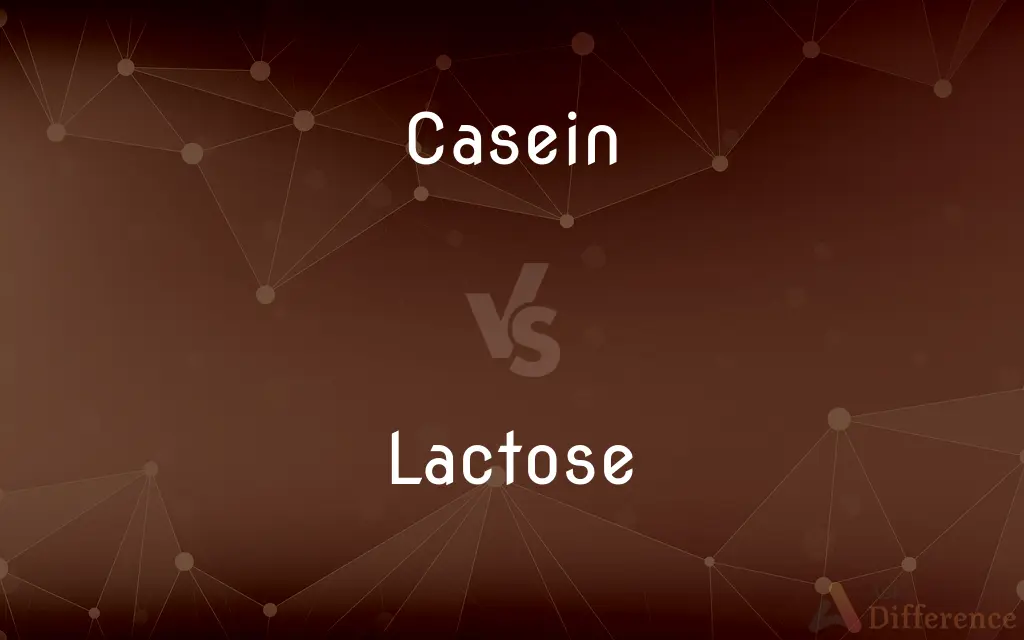Casein vs. Lactose — What's the Difference?
Edited by Tayyaba Rehman — By Fiza Rafique — Updated on September 27, 2023
Casein is a milk protein; Lactose is a milk sugar.

Difference Between Casein and Lactose
Table of Contents
ADVERTISEMENT
Key Differences
Casein is one of the major proteins found in the milk of mammals. It provides essential amino acids and plays a role in milk's coagulation. Lactose, on the other hand, is a sugar present in milk, serving as a primary carbohydrate source for young mammals.
The human body requires an enzyme called lactase to digest lactose, which some individuals may lack, leading to lactose intolerance. Casein, meanwhile, can lead to allergies in some individuals, separate from lactose intolerance.
Both casein and lactose have commercial uses; casein is used in food production, paints, and adhesives, while lactose is utilized in the pharmaceutical industry and food products.
Comparison Chart
Nature
Protein
Sugar
Function
Provides essential amino acids.
Serves as primary carbohydrate in milk.
ADVERTISEMENT
Digestive Enzyme
Broken down by various proteases.
Requires lactase for digestion.
Intolerance/Allergy
Can cause casein allergy in sensitive individuals.
Can cause symptoms in lactose intolerant individuals.
Uses
Found in food products, paints, adhesives.
Used in food products, pharmaceuticals.
Compare with Definitions
Casein
An ingredient in some paints and adhesives.
Some traditional paints utilize casein as a binding agent.
Lactose
A disaccharide sugar found in milk.
Some ice creams are high in lactose content.
Casein
A primary protein in milk and dairy products.
Many bodybuilders consume casein before bed for its slow-digesting properties.
Lactose
Used as an excipient in various medications.
Some pills contain lactose as a filler ingredient.
Casein
Provides essential amino acids.
Casein is an excellent source of protein because of its rich amino acid profile.
Lactose
It is made up of two simpler sugars, glucose and galactose.
When lactose is broken down, it yields glucose and galactose.
Casein
Can cause allergic reactions in certain individuals.
Some people avoid dairy due to a casein allergy.
Lactose
Can cause digestive problems in lactose-intolerant individuals.
She avoided regular milk due to her lactose intolerance.
Casein
Used in making cheeses due to its coagulating properties.
The curdling of milk to produce cheese is largely due to casein.
Lactose
Found in various dairy products like cheese and yogurt.
While cheese contains lactose, the amount is typically lower than that in milk.
Casein
Casein ( KAY-see-n, from Latin caseus "cheese") is a family of related phosphoproteins (αS1, αS2, β, κ). These proteins are commonly found in mammalian milk, comprising about 80% of the proteins in cow's milk and between 20% and 60% of the proteins in human milk.
Lactose
Lactose is a disaccharide. It is a sugar composed of galactose and glucose subunits and has the molecular formula C12H22O11.
Casein
A protein that is the major protein in the milk of most mammals. It is the basis of cheese and is used in food products and in certain adhesives and paints.
Lactose
A white crystalline disaccharide, C12H22O11, found in milk, that may be hydrolyzed to yield glucose and galactose. Refined lactose obtained from whey is used in infant foods, bakery products, confections, and pharmaceuticals as a diluent and excipient. Also called milk sugar.
Casein
(protein) A protein present in both milk and in the seeds of leguminous plants
Lactose
(carbohydrate) The disaccharide sugar of milk and dairy products, C12H22O11, a product of glucose and galactose used as a food and in medicinal compounds.
Casein
A proteid substance present in both the animal and the vegetable kingdom. In the animal kingdom it is chiefly found in milk, and constitutes the main part of the curd separated by rennet; in the vegetable kingdom it is found more or less abundantly in the seeds of leguminous plants. Its reactions resemble those of alkali albumin.
Lactose
The main sugar present in milk, called also sugar of milk or milk sugar. When isolated pure it is obtained crystalline; it is separable from the whey by evaporation and crystallization. It is a disaccharide with the formula C12H22O11, being chemically 4-(
Casein
A knife carried in a sheath or case.
Lactose
See Galactose.
Casein
A large table knife; - so called from being formerly kept in a case.
Lactose
A sugar comprising one glucose molecule linked to a galactose molecule; occurs only in milk;
Cow's milk contains about 4.7% lactose
Casein
A milk protein used in making e.g. plastics and adhesives
Casein
A water-base paint made with casein (which is a protein precipitated from milk)
Common Curiosities
Is Casein found only in cow's milk?
No, casein is present in the milk of various mammals, including humans.
What causes Lactose intolerance?
It occurs when the body lacks the enzyme lactase, needed to digest lactose.
Can someone be allergic to Casein?
Yes, certain individuals can have a casein allergy.
What is Lactose?
Lactose is a disaccharide sugar present in milk.
Is Lactose present in all dairy products?
Most dairy products contain lactose, but the amount varies by product.
What are the commercial uses of Casein?
Casein is used in food, paints, and adhesives.
How is Casein related to cheese-making?
Casein coagulates and forms the structure of cheese.
Is there a relationship between lactose intolerance and casein allergy?
They are distinct issues; one involves a sugar and the other a protein.
What is Casein?
Casein is a primary protein found in milk and dairy products.
Can you get lactose-free cheese?
Many cheeses, especially aged ones, have low lactose content, but specific lactose-free varieties are also available.
Can vegans consume Casein?
No, casein is an animal-derived protein.
Why is Lactose used in pharmaceuticals?
Lactose serves as an excipient or filler in many medications.
How can one determine if they're sensitive to Lactose or Casein?
Medical tests and elimination diets can help determine sensitivities to lactose or casein.
Is Casein good for muscle building?
Yes, casein is a slow-digesting protein and can help in muscle recovery.
Does lactose-free milk still contain Casein?
Yes, lactose-free milk contains casein, but the lactose sugar is removed or broken down.
Share Your Discovery

Previous Comparison
Chapter vs. Subchapter
Next Comparison
Offspring vs. SeedAuthor Spotlight
Written by
Fiza RafiqueFiza Rafique is a skilled content writer at AskDifference.com, where she meticulously refines and enhances written pieces. Drawing from her vast editorial expertise, Fiza ensures clarity, accuracy, and precision in every article. Passionate about language, she continually seeks to elevate the quality of content for readers worldwide.
Edited by
Tayyaba RehmanTayyaba Rehman is a distinguished writer, currently serving as a primary contributor to askdifference.com. As a researcher in semantics and etymology, Tayyaba's passion for the complexity of languages and their distinctions has found a perfect home on the platform. Tayyaba delves into the intricacies of language, distinguishing between commonly confused words and phrases, thereby providing clarity for readers worldwide.
















































